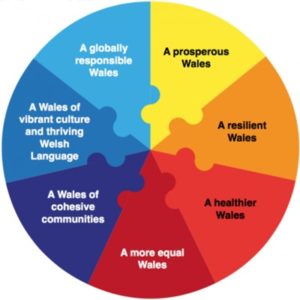In April 2015, the Well-being of Future Generations Act (FGA) came into law to create a Wales that people want to live in, now and in the future.

The FGA was the first legislation in the world to link with the UN Sustainable Development Goals and defined seven well-being goals for Wales.
All forty-four public bodies across Wales, including NRW and local authorities, have a statutory WellbeingDuty, to improve the social, economic, environmental and cultural wellbeing of Wales.
This does not mean just another ‘tick box’ exercise. The FGA requires public bodies to work better with people and communities, using ‘sustainable development principles’ and a joined-up approach to focus on a long-term shared vision, preventing problems before they occur.
Seven well-being goals
- A prosperous Wales
- A resilient Wales
- A healthier Wales
- A more equal Wales
- A Wales of cohesive communities
- A Wales of vibrant culture and thriving Welsh language
- A globally responsible Wales
Five ways of working
- Long term Safeguarding the ability to meet long-term needs, in balance with those of the short-term.
- Prevention Acting to prevent problems occurring or getting worse, to help public bodies meet their objectives.
- Integration Considering how well-being objectives may impact upon each of the well-being goals, on other objectives, and the objectives of different public bodies.
- Collaboration Acting in collaboration with any other person, or different parts of a public body, to help the body meet its well-being objectives.
- Involvement Involving people with an interest in achieving the well-being goals, and ensuring that they reflect the diversity of the area which the body serves.
What it means for flood risk management and water quality
Think back to the flooding of the Somerset Levels in December 2013…
Local residents questioned the perceived lack of presence of emergency services both during the event and afterwards for the clear up. Certain areas have since been dredged, and DEFRA ministers have visited the affected areas to offer ‘reassurance’, but this ‘government-led’ response has been described as reactive.
The FGA is intended to enable communities to join with government, specifically LAs and related public agencies, giving everyone a greater say in future strategies. It is hoped that this will make response to future climate impacts like flooding timelier and more efficient.
In relation to flood risk, perhaps the key way of working is prevention, closely linked to long-term thinking and planning. There are a number of opportunities to help prevent natural resource degradation and provide benefits across all seven of the well-being goals in Wales.
Thinking specifically about flood risk and water quality issues, strategies could include:
- greening urban areas which can reduce surface water flooding
- increasing woodland cover which can help reduce flood risk
- managing the coastline more effectively which addresses the risk of coastal flooding through managed realignment
- restoring floodplains which can help to make rivers more resilient to low and high flows and reduce flood risk
- restoring peatlands and uplands which helps reduce flood risk.
All of the above would contribute significantly to reducing the impact of climate change in the long term, and adjusting to it, and can only be addressed in an integrated way. Collaboration between a range of bodies and involvement with people living and working in the area is also crucial to ensure that proposed works can deliver intended outcomes.
How WHS can help
Project planners and managers must engage with a wide range of interested parties as early as possible during the inception stage. WHS has already worked with local authorities in Wales to incorporate FGA requirements in a range of proposals for coastal flood risk assessment and defence projects.
We anticipate that this will become ever more relevant as the impacts of climate change take hold, such as increased intensity of storm events and rising sea levels.
The last word
“Taking this approach is essential, not just because of the pressures we are under, but because it makes good sense. In Wales more than 222,000 homes are at risk of flooding and that figure is likely to increase, together with the £200 million estimated cost of putting it right.”
Sophie Howe, Future Generations Commissioner for Wales